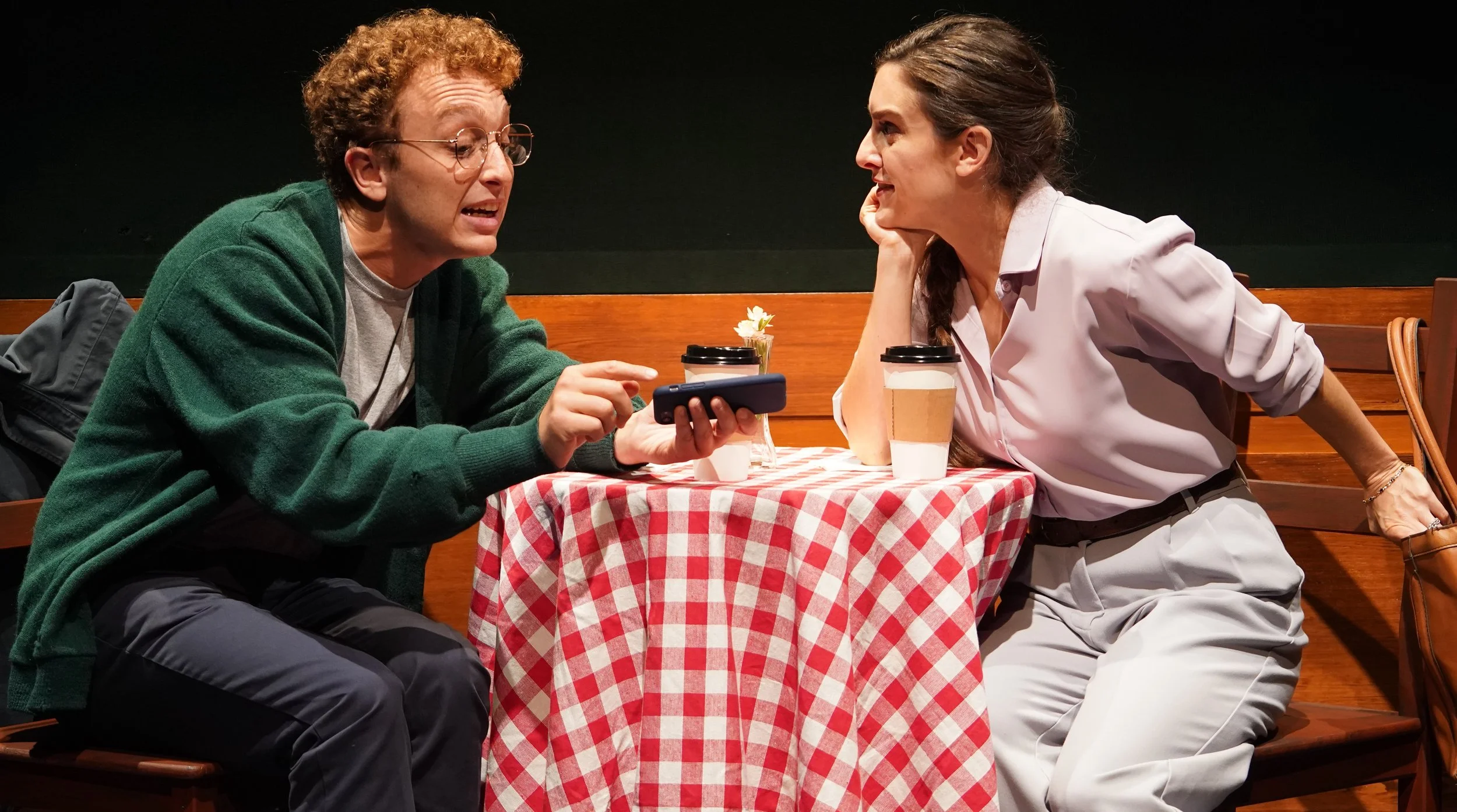Ethan J. Miller (left) is Nikolai (one of many characters Miller portrays), a Russian who is helping Natalya (Dani Stoller) research family history, in Jonathan Spector’s cerebral drama This Much I Know.
Jonathan Spector’s This Much I Know is an erudite, ambitious, and wide-ranging play in the vein of Tom Stoppard. Three actors play dozens of parts, spanning nationalities and time periods; historical events and personages alternate with the everyday problems of people trying to navigate 21st-century life; and questions of cognition, epistemology, and politics are interrogated.
If that sounds like a lot, it is. A number of patrons at 59e59 exited at the intermission, which was even commented upon by one of the actors, in character. That’s a shame, because the production, under Hayley Finn’s excellent direction—she also helmed the show at Theater J in Washington, D.C.—manages to bring Spector’s formidable script to often compelling life, thanks in large part to three committed, and elastic, performers.
Natalya and her husband, Lukesh (Firdous Bamji), a psychology professor, share a moment of emotional turmoil.
Spector won a Tony Award this year for Eureka Day, a satirical comedy about vaccine debates in a Northern California school. The two plays seem quite different, but the question of why people think what they think occupies both.
That question is central to Lukesh’s (Firdous Bamji) life and work. He is South Asian, speaks with a British accent, and teaches psychology at an American university. The play opens with one of his lectures, with the audience as stand-ins for his pupils, a conceit the play returns to repeatedly (perhaps a bit too often).
In these lectures Lukesh provides the play’s intellectual preoccupations—“one of the peculiar aspects of our mind is that we can’t really reconstruct past beliefs”—some of which are drawn from Daniel Kahneman’s book on the science of decision-making, Thinking, Fast and Slow. What could be didactic is rendered so naturally, and affably, by Bamji, and seems an extension of his character rather than just a writerly device.
What is foremost in Lukesh’s mind is the absence of his wife, Natalya (Dani Stoller). Lukesh uses visual aids in his lectures and sometimes overshares about his private life: projected texts from his wife read “I’ll be gone for a while,” followed by, “Possibly forever” (projections designed by Mona Kasra).
Svetlana Stalin (Stoller) dances with one of her four husbands, all of whom are portrayed by Miller.
Natalya has gone through a trauma that is shown later, and she chafes at Lukesh’s intellectual rationalizations: “Nothing that occurs in our lives can really affect our happiness one way or the other,” he claims.
She is writing a book that is neither novel nor memoir, fiction nor nonfiction, about her Russian grandmother, and the death of her grandmother’s parents at the hands of Stalin’s regime. This leads to an impromptu trip to Russia to uncover whether Svetlana Stalin, Joseph’s daughter and Natalya’s grandmother’s childhood friend, tried to intervene to save Natalya’s great-grandparents.
Lukesh and Natalya’s story, which is not told linearly, is interspersed with Svetlana Stalin herself, also portrayed by Stoller, seeking asylum in the U.S.; in flashbacks within this storyline, Svetlana interacts with her father via a projection voiced by Bamji.
The stage is designed as the lecture hall in which Lukesh teaches his classes, facing the audience as though they are the pupils. Photographs by Carol Rosegg.
While his wife is gone, Lukesh is dealing with a thesis advisee, Harold (Ethan J. Miller), whose family has been outed by The New Yorker as white nationalists, and whose father (pictured in projections and also voiced by Bamji) is a leader of the movement. Miller does a remarkable job of showing Harold’s layers of delusion and confusion, as he both distances himself from and clings to some aspects of the corrosive ideology in which he was raised.
All three performers play multiple characters in the various timelines, but Miller is tasked with the most dizzying array: in addition to Harold, he portrays everyone that Natalya speaks to in Russia, and in the Svetlana sequences he plays her four husbands, a childhood friend, an embassy employee when she arrives in India, and a journalist questioning her. His repeated transformations, sometimes for mere moments and sometimes for extended scenes, are seamless.
That this action unfolds on the small stage designed primarily as the lecture hall requires ingenuity on all fronts: Finn’s nimble direction; Misha Kachman’s clever scenic design, with its adaptable central playing space; and Colin K. Bills’s lighting plot, which clarifies transitions and timelines.
Spector’s ambition is commendable, and the story—with its layers and nonlinearity—can be gratifying in its complexity. However, the vast scope and detail tend to obscure the central relationship, making the ultimate payoff less emotional than likely intended.
But there is much to admire. A magic consultant is listed in the playbill, presumably for a sleight-of-hand that Lukesh demonstrates, yet mostly the production relies on that harder-to-classify theatrical magic: artists who bring vivid, complex worlds to life in the plainest of settings.
This Much I Know runs through Oct. 19 at Theater A at 59E59 (59 E 59 St.). Evening performances are 7 p.m. Tuesday through Saturday; matinees are 2 p.m. Wednesday, Saturday, and Sunday. For tickets and information, visit 59e59.org.
Playwright: Jonathan Spector
Director: Hayley Finn
Scenic Design: Misha Kachman
Costume Design: Danielle Preston
Lighting Design: Colin K. Bills
Sound Design: Sarah O’Halloran
Projection Design: Mona Kasra






